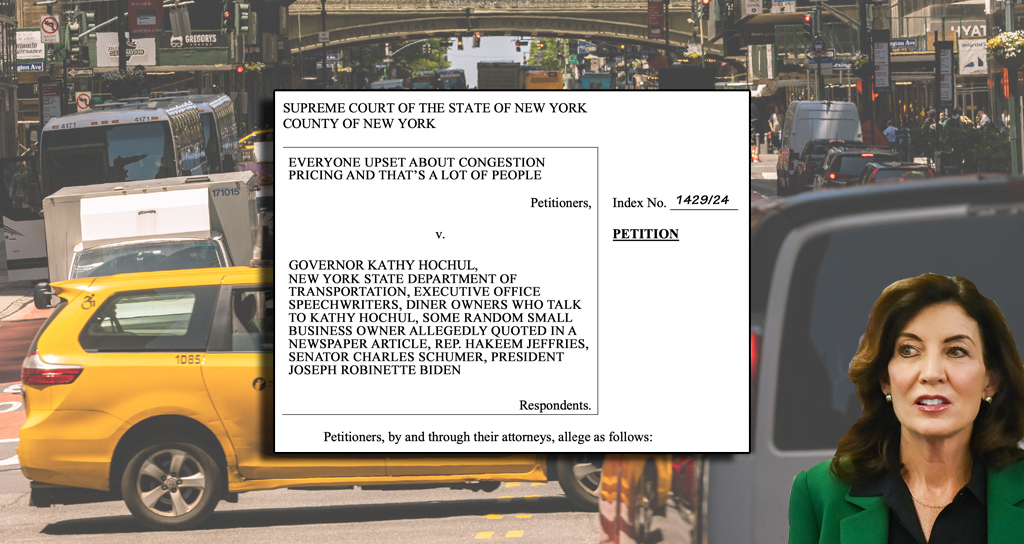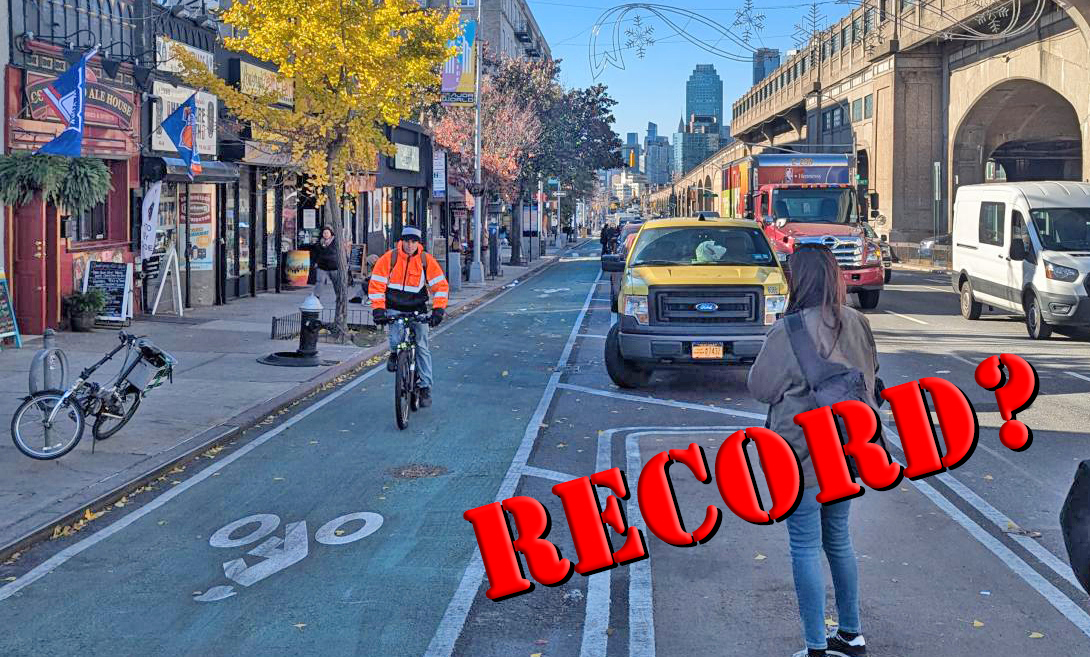Streetsblog is a non-profit newsroom devoted to covering the fight for livable cities. When we cover big, fast-moving stories like congestion pricing we kindly implore our readers to show some support to help fund our coverage. Click here if you can help. Thanks.
The editors
All eyes are now on the feds.
The question of whether Kathy Hochul can unilaterally end congestion pricing may end up in court, but before that, the Federal Highway Administration is supposed to take the final bureaucratic step: inking a formal agreement letter with the MTA and the New York City and New York State departments of transportation.
But Streetsblog has learned that the letter has not been sent, even though congestion pricing was to have started on June 30.
According to a memo that circulated over the weekend among advocates, electeds and MTA officials, that pending agreement under the federal government's "Value Pricing Pilot Program" is now Hochul's sole lever to stop the tolls from moving forward after her failure to get the state legislature to go along with her scheme.
Nonetheless, the 2019 law that established congestion pricing said the state and MTA "shall" implement tolls to enter Manhattan below 60th Street. Observers including U.S. Rep. Ritchie Torres and the Daily News Editorial Board argue that that language — not "may" or "can," but "shall" — compels Hochul and the MTA to enact the tolls.
"Just [as] local official cannot refuse to grant wedding licenses to a same-sex couple, the law of New York State (to have congestion pricing) must be carried out," the News wrote in a piece powerfully titled, "Hochul Has no Authority to Slow Down the Tolling Program."
The authorizing statute for congestion pricing contains the words “shall establish.” Not may establish but shall establish.
— Ritchie Torres (@RitchieTorres) June 8, 2024
When the will of the Executive competes with an Act of the Legislature, the law wins. Or should.
Hochul ostensibly decides whether NYS DOT enters into the agreement, but she does not have that authority under the 2019 law that mandated congestion pricing, the memo said.
Several constituencies could sue under Article 78 of state Civil Practice Law, which requires state or city officials to comply with their legal obligations under state law, but the memo suggests MTA board members would have the strongest, fastest case in court.
"It is in the best interest of the MTA and transit riders for [congestion pricing] to be enacted," the memo said. "A successful Article 78 petition enjoining all parties to offer signatures is likely the quickest and most efficient route to that outcome."
There is one catch — that the FHWA and U.S. DOT have yet to issue the VPPP agreement for the other three parties to sign, according to MTA sources.
Transit officials never expected the agreement to be any more than a formality after the FHWA conducted its review of the MTA's final environmental analysis of the tolling scheme that the MTA board approved in March, a source inside the agency said.
Will pro-pricing board reps buck the gov?
Hochul controls a plurality of votes on the MTA board, but even the governor's own appointees are frustrated with her decision to call off the June 30 launch, one source close to the board told Streetsblog.
One doesn't need to be an insider to guess as much: Hochul appointed individuals who support congestion pricing to the board in part so they would vote in favor of congestion pricing, which they did in March.
One of her appointees, Sammy Chu, serves on the board of the pro-congestion pricing New York League of Conservation Voters. Another, Haeda Mihaltses, suggested in comments before her vote for the toll that the subways might be in better shape if her ex-boss Mayor Michael Bloomberg had been able to enact congestion pricing back in 2008. Still another, John-Ross Rizzo, a prominent physician-scientist and disability advocate, has been outspoken about the importance of congestion pricing to fund accessibility upgrades.
Mayor Adams's board appointees have also spoken out against the governor's decision.
"They believe in the vote they took in March. I think a few of them were angry," the source close to the board said of the general mood on the board after news of the governor's reversal broke. "They felt blindsided."
Board members received hundreds of pro-congestion pricing emails following Hochul's announcement. A similar onslaught of calls and emails hit the State Legislature, and at least one pol set up a congestion pricing-specific voicemail inbox to handle the barrage. Callers urged legislators not to let Hochul weasel her way out of the issue with an "IOU" to fund the MTA sometime in the future.
Pols feel the pressure
It's clear that Hochul and other political leaders had only been hearing from pricing doubters and haters as the June 30 launch date approached — but that changed dramatically after she killed the plan last Wednesday.
State Sen. Jabari Brisport (D-Brooklyn) told Streetsblog his office received around 150 calls by the end of Friday afternoon — more than he'd ever gotten from constituents on any other issue.
"A lot of senators felt the pressure from the phone calls, myself included," Brisport said after speaking at a pro-congestion pricing rally on Sunday. "It's mass movements like these that are key to making sure that things can happen. To be honest, I think that if all that pressure from the outside hadn't come in, we would've been in a very different spot at the end."
"People that support [congestion pricing] were being quiet because they expected it to come," Brisport said. "Now Hochul knows that sometimes you don't always listen to the people on one side that are making the most noise."
Hochul's 180-degree turnaround on congestion pricing contradicts her years of touting the tolls, even as she has waffled between calling it a "temporary" or "indefinite" pause. In recent days, the governor has even amplified anti-tolling sentiment: Her office touted statements claiming congestion pricing is "bad for public safety," will negatively impact Manhattan south of 60th Street," and "shifts pollution, congestion, and costs onto already struggling communities."
"I, as the governor, have this ability to have a real pulse on what New Yorkers are thinking," the Buffalo-based chief executive said on Friday at a press conference at which she also claimed that diner customers are loving the move.
The MTA for its part has distanced itself from the governor — most notably in the agency's statement late Friday, which suggested the board will have to "reorganize" the MTA's $55-billion capital program "to prioritize the most basic and urgent needs" when it convenes later this month.
"The MTA Board will be evaluating what changes need to be made to the capital program in the lead-up to this month’s board meeting," the statement said, directly contradicting the governor's claim hours earlier that tolling revenue was "not essential right now... to ensure that the bonding can go forward, that the program is viable."
"Modernization and improvement projects like electric buses, accessible (ADA) stations and new signals will likely need to be deprioritized to protect and preserve the basic operation and functionality of this 100+ year old system," the MTA's statement said.
Danny Pearlstein, the spokesman for Riders Alliance, which organized Sunday's rally, said any shrinkage in the MTA's capital plan is a betrayal of a funding mechanism created in 2019 after the so-called "Summer of Hell."
"Riders and New Yorkers as a whole feel robbed of this solution that is a unique public policy to fund transit and cut traffic and pollution all at the same time," he said.
"That's why legislators heard to an unprecedented degree about this issue. There is an organized rider movement growing every day and nothing grows it like crises like the governor just created."






